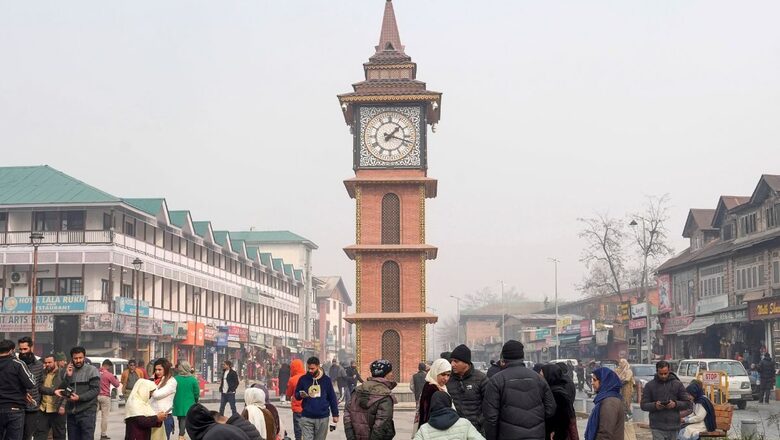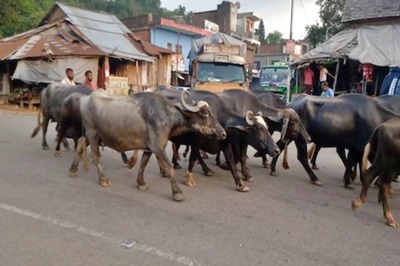
views
In the tumultuous arena of political rhetoric, amidst the cacophony of claims and challenges, there stood a singular truth, resolute and unyielding—Article 370, once hailed as an impregnable fortress shielding Kashmir, has met its definitive end. Farooq Abdullah’s vehement declaration that even if Narendra Modi were to ascend to the throne tenfold, Article 370 would stand, now echoes hollow against the resounding gavel of the legal verdict. Owaisi’s audacious challenge to the BJP is a mere gust in the face of the storm of constitutional validity that has swept away doubts. Ghulam Azad Nabi’s conviction, veiled in the longevity of Congress, now falters as the cornerstone of Article 370 crumbles under the weight of truth. Mehbooba Mufti’s ominous prophecy, foretelling the disintegration of Kashmir from India, has met its reckoning in the annals of history.
The triumph of the legal judgment, the unanimous affirmation of the Centre’s decision to abrogate Article 370, rings louder than any political conjecture or apocalyptic forecast. The reality check that dawns today is not merely a shift in the political landscape; it is the dawn of a new era—a testament to the steadfastness of India’s unity. For those who clung to the illusion of reversing this abrogation, the clarion call of the legal verdict reverberates—Article 370 was, by its very nature, a transient provision, a pawn in the hands of a few, wielded to sow seeds of division within our nation.
The historic verdict proclaims, unequivocally, that every Kashmiri stands as equal an Indian as any other citizen, and Kashmir is as much mine as Assam is of a Kashmiri, dispelling the shadows of division and separatism that once loomed large. The sacred promise made by PM Modi stands fulfilled, not as a mere electoral pledge but as an indelible mark in the annals of India’s constitutional history. Art 370, a relic of the past, now consigned to the archives, paves the way for a collective gaze towards the future—a future where every citizen breathes the same air of unity, justice, and fraternity.
The recent Supreme Court judgment delivered key conclusions on Article 370 and the Jammu & Kashmir (J&K) situation:
Article 370, termed a temporary provision, was established during wartime conditions in J&K for transitional purposes, intended to serve an interim process, as noted by the Court. The Court directed the Election Commission to conduct assembly elections in J&K by September 2024, further indicating the eventual restoration of statehood for J&K.
Regarding the validity of the J&K Reorganisation Act 2019, the Court found it unnecessary to adjudicate upon it, given the assurance by the Solicitor General that statehood would be restored to J&K. The Court acknowledged security concerns and the temporary nature of J&K’s Union Territory status.
While upholding the reorganisation of Ladakh as a Union Territory, the Court left open the question of whether Parliament has the authority to convert a state into a Union Territory. The Court validated the Presidential order abrogating Article 370, affirming that the constituent assembly’s recommendation was not binding on the President. It highlighted the transitional nature of the constituent assembly and reiterated that Article 370(3) aimed at constitutional integration rather than disintegration.
Additionally, the Court acknowledged that it couldn’t overrule the President’s decision, yet maintained that such decisions are subject to judicial review. It highlighted the collaborative process between the Union and J&K through constitutional orders, indicating an ongoing integration process, thereby validating the President’s power to issue the notification.
“Ek Desh, Ek Vidhan, Ek Pradhan,” the resounding call for a unified India, transcends the barriers of rhetoric, prevailing over divisive agendas. The abrogation of Article 370 is not just a legal victory; it is the embodiment of our collective aspiration for a stronger, more integrated nation. It is a proclamation that the sovereignty and integrity of India stand unwavering, casting aside the shadows of separatism and division.
Justice SK Kaul’s heartfelt conclusion in the Supreme Court’s judgment, as a Kashmiri Pandit himself, acknowledged the arduous struggles endured by the Kashmiri Hindu community. He emphasised the pressing need for a Truth and Reconciliation Committee (TRC) to investigate human rights violations by both state and non-state actors in Jammu and Kashmir since the 1980s. Urging swift action, he stressed the importance of preserving these memories and proposed time-bound measures for the TRC’s establishment, aiming to address the grievances and experiences of Kashmiri Hindus.
The recent passage of the Jammu and Kashmir Reservation (Amendment) Bill and the Jammu and Kashmir Reorganisation (Amendment) Bill in the Lok Sabha, underlines a pivotal step towards justice and representation in the region post the abrogation of Article 370. Home Minister Amit Shah emphasised the bills’ significance in addressing a 70-year-old deprivation of rights, particularly for those who were displaced and marginalised. By allocating representation in the assembly for displaced communities and reserving a seat for those from Pakistan-occupied Kashmir, the bills strive to empower and enfranchise those who have long been neglected. Shah’s critical reflection on past failures in handling terrorism and the reduction in terrorism incidents post Article 370’s abrogation underscores the bills’ urgency in establishing stability, inclusivity, and justice in Jammu and Kashmir. This legislative move marks a crucial stride towards rectifying historical injustices and fostering a more equitable and representative future for the region.
With an estimated addition of 20 lakh individuals under the reservation umbrella, including marginalised groups like the Pahari community and Valmiki diaspora, these bills encapsulate a monumental shift. The amendments, extending reservation quotas to a total of approximately 65 lakh individuals, vividly illustrate a monumental step towards rectifying historical injustices. For instance, the inclusion of Valmikis, after a decades-long wait for recognition, reflects a poignant journey from deprivation to hope—a community finally embraced into the folds of social and economic inclusivity. The statistical surge from 50 per cent to 60 per cent reservation coverage, coupled with the inclusion of OBCs and expansion of ST categories, resonates as a narrative of empowerment and reconciliation. These legislative strides symbolise not just numerical growth but a profound social metamorphosis—a tale of millions finding a voice, an identity, and a renewed sense of belonging in the fabric of a redefined Jammu and Kashmir.
As the dust settles on this historic judgment, let it serve as a beacon of unity, reminding us that our strength lies not in our divisions but in our unity—a unity forged through the annulment of divisive measures and the collective pursuit of a brighter, harmonious future for our beloved nation. The saga of Art 370’s fall is not merely a milestone; it is a testament to India’s resilience, unity, and unyielding spirit—a resounding affirmation that in our diversity, we find strength, and in our unity, we forge an unbreakable bond that transcends all barriers.
This momentous ruling brings emotional closure and signifies liberation from historical constraints that hindered Jammu and Kashmir’s growth. It reflects India’s stride towards unity, progress, and a brighter future. Prime Minister Modi’s leadership in addressing a long-standing issue showcases courage and foresight, leaving an enduring mark on the nation’s journey.
The past bows down to the future—an undivided, resolute India is marching ahead as one nation, one constitution.
The author is a practising advocate. She writes articles on women’s rights, politics and law. Views expressed in the above piece are personal and solely that of the author. They do not necessarily reflect News18’s views.




















Comments
0 comment